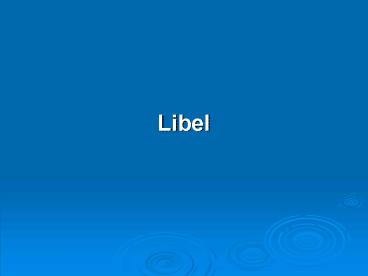Libel - PowerPoint PPT Presentation
1 / 22
Title:
Libel
Description:
online services are not publishers for simply hosting or relaying ... 3. Prereq: Defamation --Types of defamatory charges --General rules: 4. Prereq: Falsity ... – PowerPoint PPT presentation
Number of Views:30
Avg rating:3.0/5.0
Title: Libel
1
- Libel
2
- Introduction
- 1. What is Libel and Why Do We Have Such Laws?
- 2. Libel is a Continual Problem for the Media
- --Nature of the American press
- --Libel law is complicated
- --Cases are expensive
- 3. What well cover
3
- A. Establishing a Case
- 1. Prerequisite Publication
- --What constitutes publication?
- --Whos the publisher and therefore responsible?
- protection for "mere" distributors
- online services are not publishers for simply
hosting or relaying messages from other
information providers (sec. 230 of Communications
Decency Act)
4
- 2. Prereq Identification
- --Need not be named
- --ID exists in small but not large groups
- --ID can occur in works of fiction
- 3. Prereq Defamation
- --Types of defamatory charges
- --General rules
5
- 4. Prereq Falsity
- --Is the defamatory part of story substantially
false? - --When published version is compared with
accurate version, does it leave a false
impression - --Accurate attribution to a source not enough
6
- B. Fault and the Constitutional Privilege
- 1. Significance of a Constitutional Protection
- 2. Origins of a Constitutional PrivilegeNew York
Times v. Sullivan (1964) - --Civil rights group places editorial ad with
factual mistakes
7
The N.Y. Times ad, with some mistakes, that
prompted the libel suit.
8
- 2. Times v. Sullivan - contd
- --Supreme Court rules, 9-0, that
- --New rule public officials have to
9
- 3. Extending Sullivan Doctrine to Public Figures
Curtis Publishing Co. v. Butts AP v. Walker
(1967) - --Not officials but public figures
- --Actual malice in Butts but not Walker
10
- 4. Gertz v. Welch (1974) Restores Private Person
to Libel Law - --Private persons have to prove only negligence
unless states prefer tougher standard of fault - --Why protect private person's reputation?
- --Actual malice still necessary to win punitive
damages
11
- 5. Who Are Public Officials? (Actual Malice)
- --Have substantial responsibility
- --If low level, story relates to their job
12
- 6. Who Are Public Figures? (Actual Malice)
- --All-purpose public figures
- --Limited-purpose public figures
13
- 7. Fault Establishing Actual Malice
- --By inquiring into journalistic process
(Herbert) - --Defendant had serious doubts about truth
(Burnett) - --Ignored contradictory evidence (Brown
Williamson) - --Violated integrity of quotes (Masson)
14
- 8. Fault Ambiguity of Negligence Standard
- --Variability among states
- --Reasonable person exercising ordinary care
15
- C. Libel Defenses,
- Damages and Strategies
- 1. Traditional or Common Law Defense Truth
16
- 2. Traditional Defense Privileged Communications
- --Participants in official proceedings have
absolute privilege - --Qualified privilege for press derives from
absolute if its
17
- 3. Protection of Opinion
- --Traditional defense fair comment and criticism
- --Obvious exaggerations
- --Distinguish facts (unprotected) from pure
opinion (protected) by determining
18
- 4. Statute of Limitations
- 5. Jurisdictions
- --Worst case for press suit filed almost
anywhere message circulates - --Internet cases thus far jurisdiction thats
the focus of story or where plaintiff lives and
reputation hurt
19
- 6. Damages
- --Compensation for reputation and monetary loss
- --Punitive damages punish defendant
- 7. Retraction and Other Mitigating Factors
20
- 8. Strategies in Defending a Libel Suit
- --Before publication
- --Settlement?
- --Discovery stage
- --Seek summary judgment
- --Jury selection
- --Plaintiff presents case
- --Defense presents case--tactics
- --Judge's jury instructions
- --Appeals
21
- 9. Trash Torts to Get Around Libel
--Intentional infliction of emotional
distress --Attack newsgathering process
22
- 10. Reforming Libel Law































